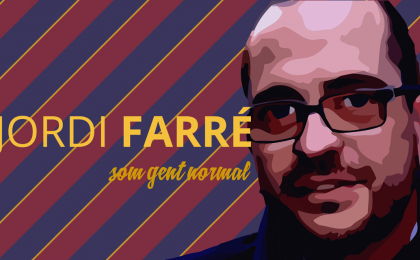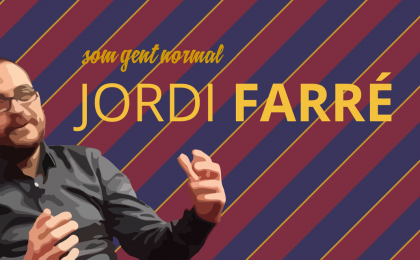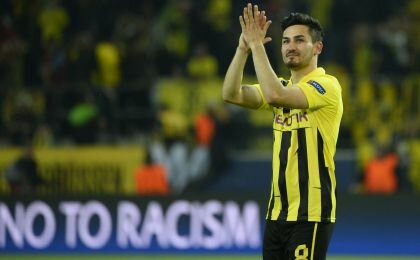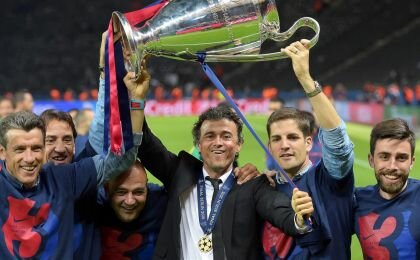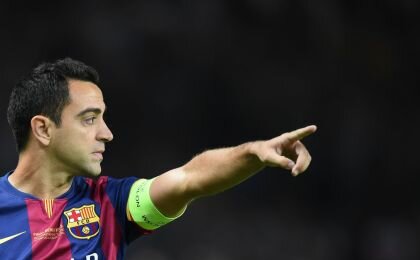 club | 2015-06-15
club | 2015-06-15
Agustí Benedito and the Barcelona Presidential elections
The man to challenge Bartomeu and Laporta?
Elections at a football club are key. It gives members a chance to cast their vote on who they feel should lead their club. It empowers fans to give the winner a legitimate mandate to rule for a substantial term in office, in Barcelona's case: six years.
But when an election is called to decide who will be the president of FC Barcelona then it becomes one of paramount importance. The upcoming election to be held this summer is arguably one of the most important in the club’s history. In the last 18 months, the Catalan institution has experienced volatile changes since Sandro Rosell won the election in 2010 – from the tragic passing of Tito Vilanova, going without a major trophy in 2013/14 and the events following Neymar’s signing in 2013 that led to Rosell’s resignation late last year. The club won all the three trophies available this season, but the uncertainties remain.
This election called by former president Josep Maria Bartomeu this week presents a fork in the road – a choice for members (socis) to either maintain the status quo with Bartomeu (who as then vice president took over from Rosell) or decide to move to a fresh outlook. One candidate offering this is Agustí Benedito.
The 48-year-old has had an experience with elections, as he took part in the 2010 elections, finishing second behind Rosell with 10 percent of the votes. Even before announcing his candidacy today, Benedito wasn't afraid to voice criticism at the Rosell/Bartomeu administrations. He's considered a breath of fresh air – a lightning rod to those exasperated by the questionable decisions made by the last board, which argubaly sullied the club’s hard-earned reputation.
One example was in February when Agustí accused the board of seriously contemplating selling Lionel Messi. Merely the thought of the Catalans selling arguably their greatest player is ludicrous. However, although the board denied it, Benedito’s accusations had inklings of justification.
This was during a period in late 2013 when there was friction between Messi and the club. It started when economic vice president Javier Faus responded to questions whether Messi would receive a contract, as it would run out in 2016. Faus’ response that he saw “no reason to improve the contract of a man whose contract was already increased six months ago” didn't please the Argentine.
The fact Messi publicly attacked Faus by stating he “knows nothing about football and wants to run the club like a business” was surprising, as Messi rarely issues public outbursts, let alone interviews. The fact Barcelona’s star player felt compelled to lash out speaks badly of the board. As of rumors to sell Messi, though almost all clubs are interested in acquiring him, it’s likely only clubs such as Chelsea, PSG and Manchester City would have the cash to do so. But to actually sell Messi would be the greatest disaster the club has endured since Luís Figo joined Real Madrid in July 2000.
Despite this, Benedito’s main grievances against the board hinged on two things, the first being Espai Barca.
In early April last year, he voiced deep concerns about Espai Barca – an extensive renovation of the Camp Nou that would include increasing the capacity to 105,000, building corporate hospitality suites, a car park with 5,000 additional parking spaces and an ice ring. The ambitious project had been announced by Rosell but was continued by Bartomeu after Rosell’s resignation.
Benedito’s main worry was how this would be funded. Bartomeu had explained that €200 million would be raised from the sale of limited naming rights of the stadium when the project is completed by 2021. The main suspicion was the sponsor would be from Qatar but it was denied it. However, Benedito’s misgivings about the beneficiaries of the proposed naming rights are well-founded, notably if you look at the trend in other clubs.
When English Premier League side Arsenal moved into their new stadium in 2006 (originally on a site called Ashburton Grove) they entered into a shirt sponsorship but also naming rights deal with Emirates. Now known as the Emirates Stadium, it will last until 2028 – a deal worth a total of £250 million (€338 million) to Arsenal.
In addition, when fellow Premier League side Manchester City came under new ownership through Sheikh Mansour, the club did the same thing as Arsenal – renaming the ground to Etihad Stadium and putting Etihad as their main sponsor. Alas, despite Benedito’s warnings, 72 percent voted in favor of Espai Barca in April 2014.
Benedito’s second and arguably main grievance against the board has to do with the growing influence of Qatar at the club. He's certainly been outspoken regarding this matter, stating: “Qatar puts into question our model and values.”
Qatar has certainly profited under the Rosell administration where Bartomeu was vice president. Prior to Rosell winning election as president in 2010, Barça had no shirt sponsorship deals with wealthy corporate sponsors, which espoused the values of Més Que Un Club (More Than A Club) where it's owned and ran by the people of Barcelona. When, in July 2006, the club entered into a five-year kit deal with UNICEF, it was widely applauded, as Barca donated €1.5 million per year to UNICEF.
Under Rosell these long-held traditions were broken by entering the club into a five-year deal worth €150 million with Qatar Sports Investments. It led to the Qatar Foundation, and then from last season, Qatar Airways, emblazoned on their shirts.
The deal itself was flagrant in ignoring traditions that had long been respected by previous administrations. Notable presidents such as Josep Lluís Núñez respected these values instilled into the club, even under the doomed tenure of Joan Gaspart.
Benedito’s main worry about Qatar is that if Bartomeu wins reelection then he will further erode the club’s values built over the last 90 years – all for the sake of profit. One of his main pledges if he wins the election is to scrap Qatar’s partnership with the club. He made this abundantly clear when interviewed by football website Goal back in February:
“The Qatar contract is very harmful for Barça. It’s not an interesting contract financially but, more importantly than that, in terms of image, values and feeling, for what Barça represents. I believe the club should stay well away from the Qatar regime. My commitment is to break, or at least not renew, the relations with Qatar,” he said.
At the moment, Benedito is a high-profile candidate to challenge Bartomeu this summer. But there is one potential candidate who hasn’t yet announced his candidacy – Joan Laporta. Should the ex-president decide to run for the presidency it will become a highly charged election with his history with the administration.
Five years ago, Sandro Rosell sued Joan Laporta (whom the Catalan businessman succeeded as president after a public falling out ended their friendship) along with his board of directors for losses of €47 million during his tenure as president. In November 2014, the court absolved Laporta and his associates of any wrongdoing. Laporta did not hide his contempt for the Bartomeu administration when speaking to Catalan paper L’Esportiu late last year, especially after certain media outlets launched a smear campaign against him. He said, “Bartomeu has always been a puppet in the hands of Rosell and, possibly, that is still the case.”
It is considered that Benedito became the first confirmed main candidate for change against the incumbent administration, the upcoming elections present a chance that will shape the club’s future. Whether that chance is used for better or worse remains to be seen.
Yousef Teclab is a Grup 14 collaborator, you can follow him on Twitter: @Yousef738.


